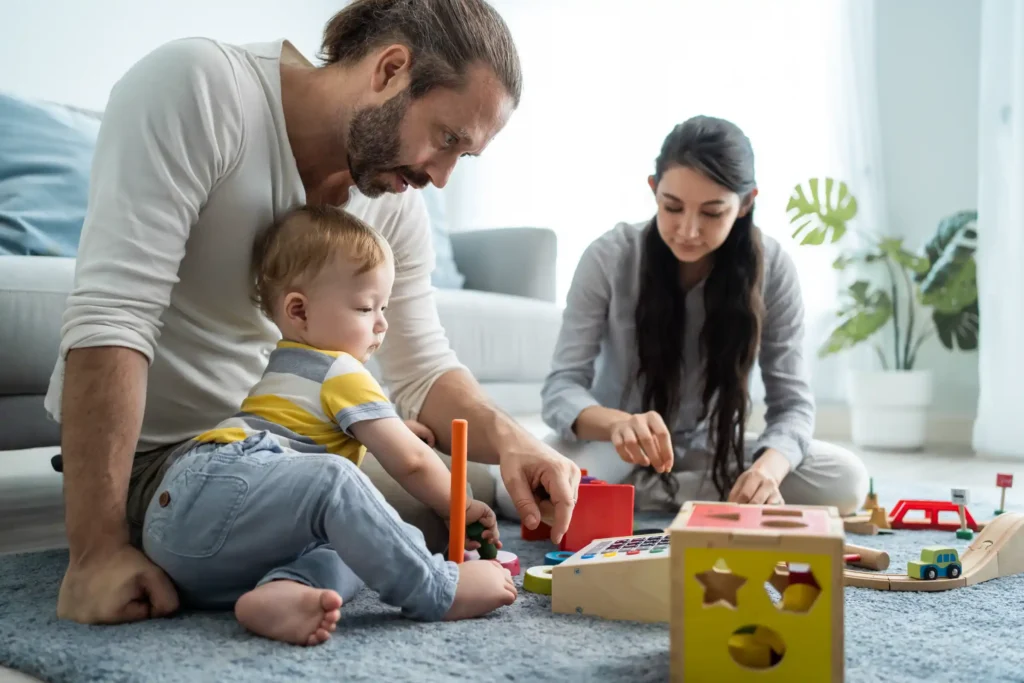 Dealing with child custody in San Jose can be challenging for any parent. Understanding legal and physical custody and focusing on your child’s best interests requires help from an experienced family law attorney. Whether you’re handling joint custody, changing existing orders, or enforcing visitation rights, having a skilled legal team is essential.
Dealing with child custody in San Jose can be challenging for any parent. Understanding legal and physical custody and focusing on your child’s best interests requires help from an experienced family law attorney. Whether you’re handling joint custody, changing existing orders, or enforcing visitation rights, having a skilled legal team is essential.
At Seeley Family Law Practice, we offer legal help tailored to your family’s needs. Our certified family law specialists are dedicated to guiding you through every part of the child custody process, ensuring your rights and your child’s well-being are prioritized. Don’t face this complex journey alone; contact us today at 650-347-9111 to schedule a consultation and take the first step toward a better future for your family.
California Child Custody Laws and Guidelines
In California, child custody decisions focus on what is best for the child. There are two main types of custody: legal custody and physical custody. Legal custody means having the right to make important decisions about your child’s life, like their education and health care. Physical custody is about where your child lives and who takes care of them day-to-day.
California law encourages both parents to stay involved in their child’s life, often supporting joint custody arrangements. This means both parents share decision-making (joint legal custody) and the child spends time with both parents (joint physical custody).
When deciding custody, courts look at things like the child’s age, health, and the relationship with each parent. They also consider if there’s a history of domestic violence or substance abuse, as these are important factors.
Parents can work together to create a plan that details custody and visitation. If they agree, the plan can be approved by the court. If not, the court will decide based on what’s best for the child.
Child Custody Matters in San Jose
Child custody matters in San Jose require a careful balance between legal rules and the child’s emotional well-being. The main goal in any custody decision is to focus on what is best for the child. This ensures that every decision supports the child’s emotional, mental, and physical health.
There are two main types of custody: legal custody and physical custody. Legal custody involves who can make important decisions about the child’s life, such as their education, healthcare, and religious upbringing. Physical custody refers to where the child will live daily.
Dealing with child custody can be challenging, often filled with emotional and legal hurdles. Having knowledgeable support is crucial. Legal professionals provide valuable help by explaining your rights and responsibilities and ensuring that the custody arrangements are in the child’s best interests.
Legal Custody vs. Physical Custody
When talking about child custody, it’s important to know the difference between legal custody and physical custody. Legal custody gives the right to make big decisions about the child’s life, including their education and healthcare. Parents with legal custody are responsible for guiding their child’s future.
Physical custody, on the other hand, is about where the child lives and who takes care of them daily. It affects the child’s routine and happiness, making it a key part of custody arrangements.
Sole Custody and Joint Custody Options
In child custody cases, parents can choose between sole custody or joint custody, each with its own pros and cons. Sole legal custody means one parent has the sole authority to make major decisions about the child’s life and where they will live. This is often chosen when one parent is better equipped to provide a stable and caring environment.
Joint custody, on the other hand, allows both parents to share responsibilities and time with the child. Joint legal custody means both parents make important decisions together, while joint physical custody ensures the child spends significant time with both parents. This setup can encourage cooperation and a balanced relationship for the child.
Choosing between sole and joint custody involves thinking about the child’s needs and how well the parents can work together. Each option has its own challenges and benefits, but the main goal is always the child’s best interests.
How We Help with Child Custody Cases
At Seeley Family Law Practice, we understand that every child custody case is different, so we provide customized legal advice to fit each family’s needs. Our San Jose custody attorneys focus on giving clear and helpful guidance, making sure clients understand their options and the potential outcomes. This helps clients make confident and informed decisions.
We are committed to providing supportive and effective representation, balancing empathy with assertiveness to achieve the best results for our clients. Our clients appreciate the prompt and efficient assistance they receive, which directly helps them achieve their goals in child custody cases.
With a wealth of trial experience, Seeley Family Law Practice is prepared to handle even the most complicated custody issues, ensuring our clients’ interests are effectively represented in both agreed-upon arrangements and court decisions.
Developing a Custody Arrangement
Creating a fair custody plan is crucial for every family. At Seeley Family Law Practice, we work closely with parents to create custody and parenting time agreements that fit their unique situations. This team approach ensures both parents contribute to a plan that supports the child’s best interests and family dynamics.
If parents agree on the terms, they can set up a custody agreement without going to court. This saves time, reduces stress, and lets parents control decisions about their child’s future. A well-made custody plan can positively affect family relationships and the child’s well-being.
Our team is here to guide parents through this process, offering support and expertise to create custody arrangements that work for everyone involved. By focusing on the child’s best interests, we help families manage this challenging time with ease and confidence.
Modifying Existing Custody Orders
Life changes, and sometimes custody orders need to be updated. Big changes, like a new job, moving to a new place, or changes in the child’s needs, might require a new look at custody terms.
To change custody, you usually need to file a request in court to review and possibly update the custody order. This makes sure the new plan fits the child’s current needs and best interests. Our firm is skilled in handling this legal process, helping clients present their cases, and ensuring modifications benefit the child.
Visitation orders can also change if there are significant changes in circumstances. Our team helps document these changes and advocate for updates that match the child’s evolving needs. By staying flexible, we help families keep arrangements that support the child’s growth and well-being.
The Importance of Parental Fitness in Custody Decisions
In custody decisions, the court starts by assuming both parents have equal rights unless there’s proof otherwise. Checking if a parent is fit to care for their child is crucial. The court looks at each parent’s ability to care for their child, considering things like past actions, criminal records, mental health, and whether they can provide a safe and loving home.
If a parent has a history of leaving their child, abuse, or serious crimes like domestic violence, it can affect custody decisions, possibly leading to limits or loss of custody rights. Judges also want parents to work together and avoid actions that harm the child’s relationship with the other parent. The main aim is to ensure the child grows up in a supportive and loving home.
A parent considered unfit because of a serious criminal past or inability to provide a safe home may lose custody rights. Parents need to show they care about their child’s well-being and are willing to maintain a positive relationship with the other parent. The court’s goal is to create a stable and healthy environment for the child to grow and thrive.
Visitation Rights and Enforcement
Visitation rights are key to making sure the non-custodial parent stays connected with their child. Court orders usually define when and how the non-custodial parent can visit the child. These rights are important for keeping the child’s emotional health and connection with both parents.
Sometimes, grandparents can also ask for visitation rights through the court, especially during custody disputes or when no other family law issues are happening. This helps ensure the child stays connected with their extended family, adding more support and stability.
If visitation orders aren’t followed, there can be legal actions to enforce them. Our firm helps clients make sure visitation rights are respected and provides legal help to fix any issues. By ensuring these rights are upheld, we help maintain the child’s relationships and ensure custody agreements are followed correctly.
Contact Seeley Family Law Practice for Child Custody Guidance
Seeley Family Law Practice is here to help you with child custody issues in San Jose. Our team of certified family law specialists is skilled in handling all kinds of cases, providing you with caring and personalized support.
We are available anytime to offer the guidance and representation you need. We focus on maintaining high ethical standards and respect with clients and court personnel, aiming to resolve cases positively. Every child custody situation is unique, and we work closely with you to create strategies that fit your needs, whether your case is simple or complex.
At Seeley Family Law Practice, your child’s well-being is our priority. We handle everything from setting up custody arrangements to changing existing orders and ensuring visitation rights are followed. Our goal is to give you the knowledge and support to make confident decisions.
Don’t face child custody challenges alone. Contact Seeley Family Law Practice at 650-347-9111 for help and support from experienced San Jose child custody lawyers. Call us today to set up a consultation and take the first step toward a better future for your family.
Child Custody FAQs
How is child custody determined? In California, child custody decisions are based on the child’s best interests. The court considers factors such as the child’s age, health, emotional ties with each parent, the parent’s ability to care for the child, and any history of family violence or substance abuse.
Can my child choose which parent to live with? While a child’s preference may be considered, it is not the sole factor in custody decisions. The court evaluates the child’s maturity and reasons for their preference, ensuring that the final decision aligns with their best interests.
What is the difference between legal custody and physical custody? Legal custody involves the right to make important decisions about the child’s life, such as education and healthcare. Physical custody determines where the child lives and who provides daily care.
Can custody arrangements be modified? Yes, custody arrangements can be modified if there are significant changes in circumstances, such as relocation, changes in the child’s needs, or a parent’s ability to care for the child.
What happens if one parent violates custody orders? If a parent violates custody orders, legal action may be taken to enforce the orders. This could involve court intervention to ensure compliance and protect the child’s best interests.
